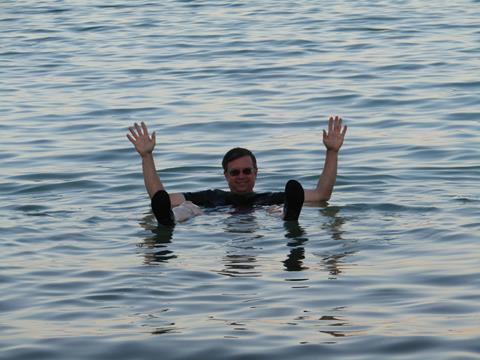With all eyes on the Middle East, Nancy and I are fondly remembering our visit to Israel in 2018. It was a privilege to visit so many Biblical sites and to reflect on the lessons to be learned at each one. We invite you to pray with us for a swift and peaceful end to the hostilities and for the protection of the Jewish people there and everywhere.
While we were in Israel, we had the privilege to float in the Dead Sea. Some have called the Dead Sea the Eighth Wonder of the World and with good reason. It truly is a magnificent landform and one of the most unique on the planet. It is found at the lowest place on earth at 1410 feet below sea level and forms a boundary between Israel and Jordan.
The name of this body of water stems from its salt content. With a salinity of 37 percent, it is nearly ten times saltier than seawater and the mineral deposits around its shoreline are found in some very unusual shapes. Because of the high salt concentration, very few life forms can survive there, although recent freshwater sinkholes have been found with microorganisms as well as some fish!
How did the Dead Sea, or Salt Sea as it is sometimes called, get so salty? Because it has no outlet. The Jordan River is the chief tributary flowing into the northern end of this large inland lake but because of its low elevation, there is no outflow. The only way moisture can escape the lake is by evaporation which leaves behind whatever minerals and salts were dissolved in it.
As a result of this natural phenomenon, the Dead Sea has been getting saltier for several centuries. Although this prohibits most life, it does create some rich resources that are used as fertilizers and soil additives which are shipped all over the world including our valley. In addition, these minerals are incorporated into skin creams and hair products that are highly valued for their cosmetic qualities.
The most unusual characteristic of the Dead Sea, however, is the inability to sink in its water. Although I never learned to float while swimming, it is impossible not to do so in the Dead Sea. You must be careful not to get the water in your eyes or nose as this causes severe problems, but thousands come from around the world each year to float in this unique water.
After our last visit, it occurred to me that this exceptional creation reflects a spiritual truth. Day after day and year after year, God pours blessings into and around us. Some of these are physical, some are financial, and some are spiritual. But He never intends for us to be dead end reservoirs simply collecting and hoarding His gifts. Doing so would indicate just how low we really are.
Instead, God has blessed us so that we can bless others. He intends for us to share our wealth, wisdom, joy, and abilities with those around us who also can benefit from them. If we become a cul-de-sac of His benefits and fail to pass on His blessings, we become stagnant and miserable and stifle life around us.
Although the Dead Sea has no ability to create a natural outlet for itself, we do. Thankfully, we can change our behavior at any time and begin sharing what we have with others. The Bible teaches that this should be voluntary and a natural consequence of imitating Jesus. Solomon tells us in Proverbs 11:25 that, “A generous man will prosper; he who refreshes others will himself be refreshed,” and Jesus Himself said, (Matt 10:8) “Freely you have received, freely give.”
If we are already sharing our resources, let’s explore ways to expand the outflow. Not only does it keep us spiritually healthy, it also blesses all those downstream. Blessings! George
